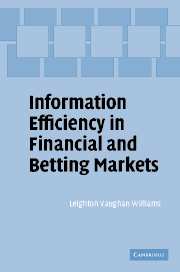Book contents
- Frontmatter
- Contents
- List of figures
- List of tables
- List of contributors
- Introduction
- Part I The concept of information efficiency
- Part II Selected readings
- 4 An assessment of quasi-arbitrage opportunities in two fixed-odds horse-race betting markets
- 5 The presence of favourites and biases in bookmakers' odds
- 6 Searching for semi-strong form inefficiency in the UK racetrack betting market
- 7 Models, markets, polls and pundits: a case study of information efficiency
- 8 Longshot bias: insights from the betting market on men's professional tennis
- 9 Biases and insider trading in exotic bets on thoroughbreds
- 10 On the improbability of information efficient parimutuel betting markets in the presence of heterogeneous beliefs
- 11 Modelling gambling demand in a laboratory casino: discovering the importance of individual-specific effects
- 12 Market efficiency of the 50–30–20–10 horse-racing spread betting market
- 13 Insider trading and bias in a market for state-contingent claims
- 14 Rationality and efficiency in lotto games
- 15 Efficiency of the odds on English professional football matches
- 16 Modelling distance preference in flat racing via average velocity
- 17 Testing for market efficiency in gambling markets: some observations and new statistical tests based on a bootstrap method
- 18 Information (in)efficiency in prediction markets
- Index
- References
4 - An assessment of quasi-arbitrage opportunities in two fixed-odds horse-race betting markets
Published online by Cambridge University Press: 09 July 2009
- Frontmatter
- Contents
- List of figures
- List of tables
- List of contributors
- Introduction
- Part I The concept of information efficiency
- Part II Selected readings
- 4 An assessment of quasi-arbitrage opportunities in two fixed-odds horse-race betting markets
- 5 The presence of favourites and biases in bookmakers' odds
- 6 Searching for semi-strong form inefficiency in the UK racetrack betting market
- 7 Models, markets, polls and pundits: a case study of information efficiency
- 8 Longshot bias: insights from the betting market on men's professional tennis
- 9 Biases and insider trading in exotic bets on thoroughbreds
- 10 On the improbability of information efficient parimutuel betting markets in the presence of heterogeneous beliefs
- 11 Modelling gambling demand in a laboratory casino: discovering the importance of individual-specific effects
- 12 Market efficiency of the 50–30–20–10 horse-racing spread betting market
- 13 Insider trading and bias in a market for state-contingent claims
- 14 Rationality and efficiency in lotto games
- 15 Efficiency of the odds on English professional football matches
- 16 Modelling distance preference in flat racing via average velocity
- 17 Testing for market efficiency in gambling markets: some observations and new statistical tests based on a bootstrap method
- 18 Information (in)efficiency in prediction markets
- Index
- References
Summary
Introduction
In this chapter, we build upon work by Vaughan Williams (2000, 2001) and Paton and Vaughan Williams (2005) who examine the concept of Quasi-Arbitrage Opportunities (Quarbs), a class of weak form market inefficiencies. Quarbs exploit apparent differences in subjective assessments of the value of an asset (in this study the asset is a class of state contingent claims, namely racehorse bets). Such a strategy requires the existence of a number of market-makers contemporaneously offering the same asset at different prices. The assumption underpinning a Quarb strategy is that the consensus market price is a better indicator of the asset's objective value than the outlier price. Further, if we can estimate the true or objective value of the asset from the market mean price, it may be possible to trade the asset profitably at the outlier price (in the case of racehorse bets, by obtaining longer odds than the mean).
Our chapter describes the application of a simple Quarb model to two distinct datasets, one comprising 549 races, the other 700 races, to establish whether or not this type of inefficiency is evident in fixed-odds horse-race betting markets in the UK, and whether it can be exploited with an appropriate betting strategy. Specifically, the initial premise is that the mean morning odds available about a horse are a more accurate reflection of its winning chance than the odds outlier.
- Type
- Chapter
- Information
- Information Efficiency in Financial and Betting Markets , pp. 159 - 171Publisher: Cambridge University PressPrint publication year: 2005
References
- 3
- Cited by

